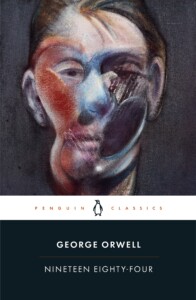DOUBLETHINK and Consumer Capitalism, by Julian Baggini

Share this
‘How could you communicate with the future?’ Winston Smith asked himself in Nineteen Eighty-Four.
‘It was of its nature impossible. Either the future would resemble the present, in which case it would not listen to him: or it would be different from it, and his predicament would be meaningless.’
The enduring appeal of Orwell’s novel shows there’s something wrong with this logic. The book still speaks to us because our world is neither totally the same as Orwell’s nor completely different. Our time resembles his like a grandchild resembles a grandparent: some features remain the same but the iteration of each generation is also significantly different.
The ideas in Nineteen Eighty-Four resonate with each generation precisely because the fictional world Orwell describes has never come to pass, but features of it most certainly have. One of the most striking examples of this is the oppressively upper-case DOUBLETHINK. It is defined in the book as ‘the power of holding two contradictory beliefs in one’s mind simultaneously, and accepting both of them.’ This leads to a paradoxical state of self-deception whereby the speaker ‘knows that he is playing tricks with reality; but by the exercise of DOUBLETHINK he also satisfies himself that reality is not violated.’
DOUBLETHINK is alive and well today, but not primarily in the political arena. Of course, politicians sometimes say the opposite of what they really mean and contradict themselves even within the same speech. But on the whole such dishonesty is knowing. Only recently, with the rise of Boris Johnson and Donald Trump have we seriously had to ask ourselves whether they really believe their own lies. The political spinner ‘knows that he is playing tricks with reality’ but is under no illusions that ‘reality is not violated’.
Where DOUBLETHINK has most thrived is not within the political realm but in the domain of consumer capitalism. This is most evident in advertising and marketing, when words so often mean their exact opposite. There’s a game I play when I go to the cinema that proves this. It’s called ‘guess what the advert is for’. Whenever one comes on that talks about lofty ideals, I know it’s going to be for either a financial service or a car. They talk the language of non-materialist values to get us to buy the most material of goods and services.
A great example of this was an advert for a French car that ran a decade or so back. The ad showed a business-man running into the forest, discarding his suitcase, tearing off his suit before diving naked into a pristine pool of water. He had left behind the rat race – and this is supposed to make us want to buy a car!
Another recurring example is ‘confidence’. Whenever a product tries to sell you confidence you know that it’s already given you insecurity. It needs to create the problem it promises to solve. This is the oldest trick in the book. People were made paranoid about their bad breath, body odour or ‘unsightly’ hair so that companies could make them feel confident again by dealing with these largely invented problems.
For instance, in the 1920s Listerine was an antiseptic struggling to build market share. It built its brand by finding a new use for itself, with adverts proclaiming ‘Halitosis makes you unpopular’. In doing so it named a pseudo-medical condition that simply didn’t exist before.
The attitude of advertisers and their corporate paymasters to the gullible masses reflects that of the Party in Nineteen Eighty-Four towards the working class. Just as the Party claimed ‘to have liberated the proles from bondage’ consumer capitalism promises that a world of opportunity and freedom awaits, if only we buy the right things. This, of course, fits the needs of the ruling classes. So long as people feel that they can fulfil their needs as consumers, they will be content with their station in life and will avoid any political agitation.
‘Work, the care of home and children, petty quarrels with neighbours, films, football, beer, and above all, gambling, filled up the horizon of their minds. To keep them in control was not difficult.’
Orwell was prescient in seeing that the emergence of ‘the machine’, as he called the system of industrial production, was not going to deliver the social benefits most people then believed were inevitable. Reflecting the consensus of his time, Orwell wrote that the machine offered a ‘vision of a future society unbelievably rich, leisured, orderly, and efficient – a glittering antiseptic world of glass and steel and snow-white concrete’. It was evident that ‘Science and technology were developing at a prodigious speed, and it seemed natural to assume that they would go on developing.’ If the machine was used wisely, ‘hunger, overwork, dirt, illiteracy, and disease could be eliminated within a few generations.’ After all, without anyone deliberately directing it, ‘the machine did raise the living standards of the average human being very greatly over a period of about fifty years at the end of the nineteenth and the beginning of the twentieth centuries.’
In Nineteen Eighty-Four, Orwell squashed this optimism by envisaging an all-powerful state that would ensure the machine did not further the welfare of the ordinary citizen. He was right about the effects but wrong about the cause. Business-driven consumerism has fulfilled the role that Orwell believed would be played by government-led warfare. The ‘primary aim of modern warfare’ in Nineteen Eighty-Four was ‘to use up the products of the machine without raising the general standard of living.’ Consumer capitalism has done a remarkably similar job. True, it has improved the standard of living in many ways: modern washing-machines, televisions, heating systems and so on work much better at far lower real cost than they used to. But in a more profound sense, this material plenty has not improved quality of life, at least not as much as it should. That is in part because left to its own devices, consumer capitalism has no interest in making people’s lives better. It is only concerned with satisfying their perceived needs, and manipulating their perceptions so people believe they need what can be sold to them.
Such critiques of consumer capitalism have become commonplace. But Orwell deserves credit for more than getting there first. He helps explain exactly why the system works the way it does much better than most of our contemporaries do.
For many, capitalism is attributed with a kind of will of its own, before which society is impotent. But there is nothing inherent in the capitalist economic model that results in an economy indifferent to the welfare of citizens. Capitalism follows the money and if consumers and businesses decided to spend it wisely and ethically, supply would follow demand.
Equally unsatisfactory is the idea that everyone in business is a selfish egotist who cares for nothing but profit. This is patently not true. People go home to their families believing they are good people and that their businesses are socially responsible. Cynicism might explain some particularly egregious bad practice but it can’t explain the vast majority.
For consumer capitalism to function as it does it requires that people, not the system, pursue short-term profit above all else. But for that to work they cannot believe that this is what they are actually doing. As Orwell put it, ‘The process has to be conscious, or it would not be carried out with sufficient precision, but it also has to be unconscious, or it would bring with it a feeling of falsity and hence of guilt.’
Hence DOUBLETHINK. The economy is being directed by people who are smart enough to come up with lies to sell and also to believe them.
‘To tell deliberate lies while genuinely believing in them, to forget any fact that has become inconvenient, and then, when it becomes necessary again, to draw it back from oblivion for just so long as it is needed, to deny the existence of objective reality and all the while to take account of the reality which one denies – all this is indispensably necessary.’
When I read these words I remember the shocking speed with which people I knew swallowed the corporate lines of the companies they joined as graduates. I also think of the principled journalists who quickly learn to justify the tabloid fear-mongers and ad-chasing glossies that employ them.
No one wants believe that they earn their living selling shit to people who don’t need it. They want to believe that they offer a good product or service, one which their customers genuinely appreciate. So they will convince themselves that their business is fair and sustainable when in other contexts they know full well the meaning of those words and so also know they can’t possibly apply to what they do.
The most frightening thing is that the double-thinkers are far from stupid. Many are very smart indeed. But, again, Orwell knew that.
‘In our society, those who have the best knowledge of what is happening are also those who are furthest from seeing the world as it is. In general, the greater the understanding, the greater the delusion; the more intelligent, the less sane.’
I can think of no better description of the people who work in marketing, PR and advertising. Their understanding of human nature and psychology knows no equal. That’s precisely why they are so good at manipulating us. But to do so and recognise the cynicism this implies would be too demeaning. Fortunately, clever people are the best at rationalising. Their secret is safe with themselves.
DOUBLETHINK requires us ‘To know and not to know, to be conscious of complete truthfulness while telling carefully constructed lies, to hold simultaneously two opinions which cancelled out, knowing them to be contradictory and believing in both of them, to use logic against logic, to repudiate morality while laying claim to it.’ It is not in government that such thinking dominates but in the companies whose profits fuel the consumer economy.
WAR IS PEACE
FREEDOM IS SLAVERY
IGNORANCE IS STRENGTH
